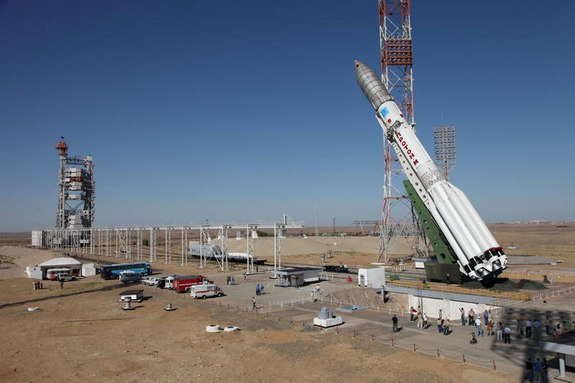Russian Space Agency Roscosmos will suspend the launches of Proton-M rocket carriers with Briz-M boosters following the incident on late Monday when the booster had failed to bring two satellites into a calculated transition orbit, a space industry source said on Tuesday.
“All further Proton launches will be postponed until the emergency commission, which is likely to be established soon, determines the cause of the failure,” the source said.
Russia launched a Proton rocket with Briz-M booster carrying the Telkom-3 and the Express MD2 satellites at 11:31 p.m. Moscow time [7:31 p.m. GMT] on Monday from the Baikonur space center in Kazakhstan. However the booster and the two satellites have not been detected in transition orbit because of the suspected mishap of the Briz’s engines.
Earlier on Tuesday, a space industry source said that the booster had become a potentially hazardous piece of space junk.
Human error may be behind the failure, a space expert told RIA Novosti on condition of anonymity.
“As for this incident, human error is likely to be there. Two things may be wrong here, either the mission task wasn’t properly calculated or some mishap with the booster’s engine occurred when it was already being fired in space,” the expert said.
The two satellites being carried on the Proton-M rocket, Telkom-3 and Express MD2, were to provide TV broadcast services in Indonesia.
Telkom-3 satellite was built by Russia’s Reshetnev space company with communication equipment from Thales Alenia Space.
The Express MD2 is a small communication satellite designed and manufactured by the Khrunichev State Research and Production Space Center for the Russian Satellite Communications Company(RSCC).
It is the first time Indonesia has bought a satellite from Russia.
Both satellites were insured by Russian Ingosstrakh and Alfa Strakhovanie. Coverage totaled 1.17 billion rubles ($39 million) for the Express MD2 and 225 million rubles for the Telkom-3.
Briz-M’s history dates back to July 5, 1999 when the first launch resulted in a malfunction of the Proton’s second stage, preventing the booster and its payload from reaching the orbit.
In August 2011, the malfunction of a Briz-M booster led to the loss of the Express-AM4 telecommunication satellite.










